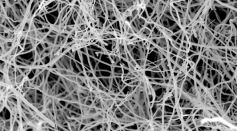Tags: Carbon nanotubes
Carbon Nanotube Yarns Unlock Low-Grade Waste Heat Energy Harvesting [Study]

Catalytic Process Converts CO2 Into Usable Carbon Nanofibers; Can This Help Offset Greenhouse Emissions?
Boosting Electrochemical Energy Storage of Carbon Nanotubes by Creating a Hybrid Material From Polyoxometalate Molecules
Ovarian Cancer Detection: Two Studies Reveal New Approach for Detecting the Disease Using a Nanosensor Platform
New Strategy in Engineering Mixes Industrial Plastic with Carbon Nanotubes to Devise Tougher, Stronger, Smarter Materials

Novel Lightweight Nanofiber Material Protects Against Space Debris and Better Than Existing Bulletproof Technology

3D-Printed Back Brace Made of Carbon Nanotubes Detects Stress and Strain for Better-Fine-Tuning Scoliosis Treatment
Magic Wand-Like Tool Developed Using Nanomaterials; New Imaging Technology to Help with Next-Gen Electronics
Carbon Nanotubes: Novel Sensor That Can Detect SARS-CoV-2 Developed; Results in Just a Few Minutes
Generating Electricity: MIT Engineers Discover New Using Tiny Carbon Particles
UT Dallas Researchers Lead Fabrication of Powerful Unipolar Carbon Nanotube “Muscles”
New “Smart Bandage” Could Detect and Prevent Infections
Scientists Establish Relationship Between Nanotube Length and Friction, To Guide Creation of Stronger Fibers
Researchers Develop Carbon Nanotube Water Filters
Nanobiotechnology: Is It Safe?
Carbon Nanotubes Soon Become The Future Of Water Filtration, Perfect Alternative To Eliminate Toxins & Other Contaminants
Carbon Nanotubes Device Captures Elusive Bioparticles
Most Popular

Trump Administration Declares COVID-19 Likely Originated from Wuhan Lab Leak, Citing Scientific Evidence

Largest Known Volcanic Aquifer Discovered Beneath Oregon's Cascades

New 'Supergiant' Sea Bug Found in South China Sea, Named After Darth Vader

Mediterranean Sea Was Refilled by a Catastrophic Flood Millions of Years Ago




